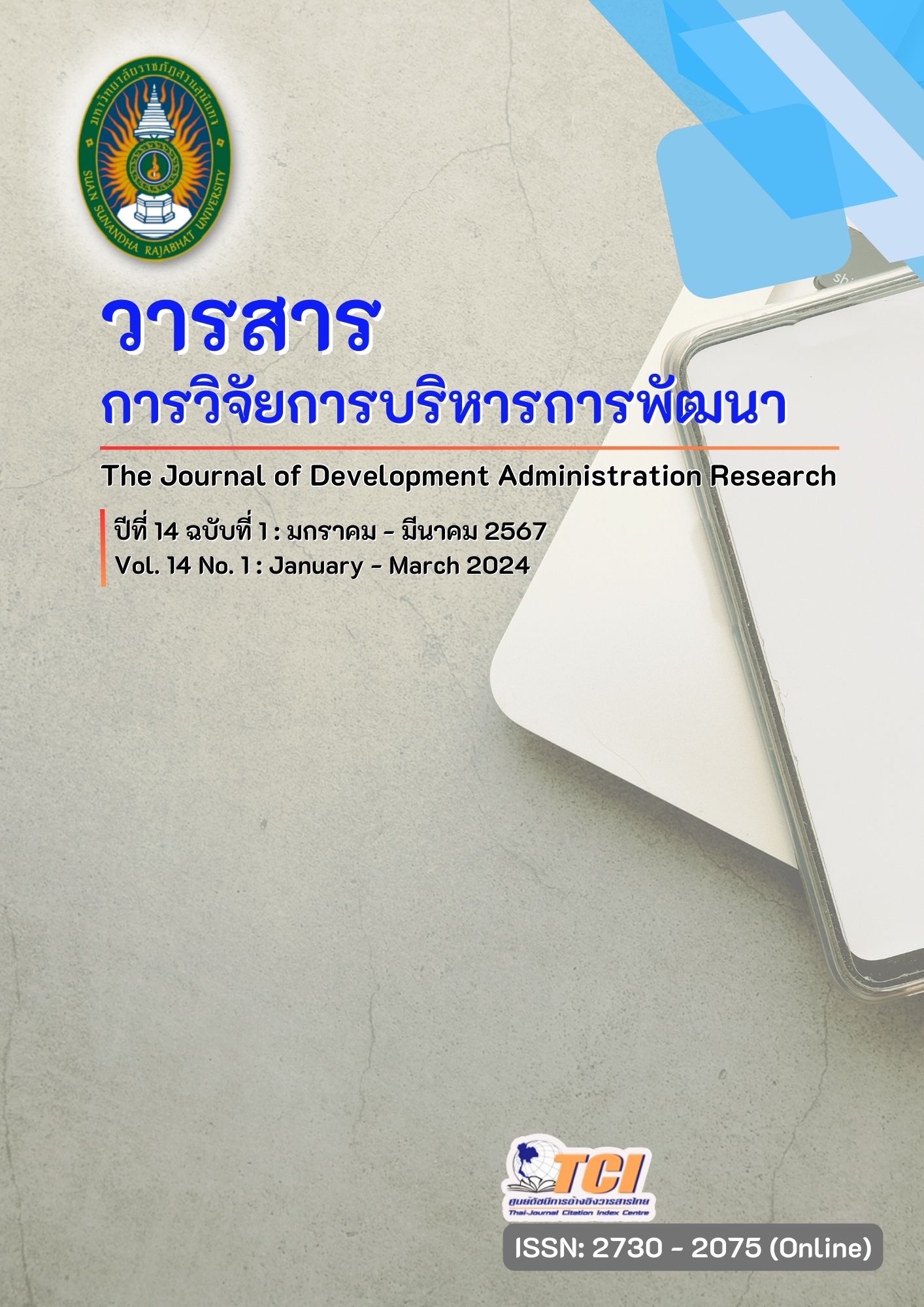แบบจำลองประสิทธิผลการดำเนินธุรกิจการจำหน่ายผลิตภัณฑ์เนื้อสัตว์ ในประเทศไทย
คำสำคัญ:
แบบจำลองประสิทธิผล, การมุ่งเน้นความเป็นผู้ประกอบการ, การบริหารคุณภาพโดยรวม, นวัตกรรม, ความสามารถเชิงพลวัตบทคัดย่อ
วัตถุประสงค์ของวิจัยนี้เพื่อ 1) ศึกษาระดับของการมุ่งเน้นความเป็นผู้ประกอบการ การบริหารคุณภาพโดยรวม นวัตกรรม ความสามารถเชิงพลวัต ความได้เปรียบทางการแข่งขัน และประสิทธิผลการดำเนินงานธุรกิจ 2) ศึกษาอิทธิพลของการมุ่งเน้นความเป็นผู้ประกอบการ การบริหารคุณภาพโดยรวม นวัตกรรม ความสามารถเชิงพลวัต ความได้เปรียบทางการแข่งขัน ต่อภาวะผู้นำการเปลี่ยนแปลง บรรยากาศองค์กร ความพึงพอใจในงาน ความผูกพัน ต่อประสิทธิผลการดำเนินงานธุรกิจ 3) พัฒนารูปแบบจำลองประสิทธิผลการดำเนินงานธุรกิจ การวิจัยนี้เป็นการวิจัยแบบผสมผสาน การวิจัยเชิงปริมาณ กลุ่มตัวอย่างคือ ผู้ประกอบการจำหน่ายผลิตภัณฑ์เนื้อสัตว์ จำนวน 420 คน ใช้วิธีการสุ่มแบบแบ่งกลุ่ม รวบรวมข้อมูลโดยใช้แบบสอบถาม วิเคราะห์ข้อมูลด้วย ค่าเฉลี่ย ส่วนเบี่ยงเบนมาตรฐาน และสมการโครงสร้าง การวิจัยเชิงคุณภาพใช้วิธีการสนทนากลุ่ม ได้แก่ ผู้บริหารหรือผู้จัดการร้านสถานที่จำหน่ายผลิตภัณฑ์เนื้อสัตว์ที่มีประสบการณ์ในการปฏิบัติงานตั้งแต่ 5 ปีขึ้นไป และผู้บริหารหน่วยงานภาครัฐที่เกี่ยวข้อง จำนวน 15 คน วิเคราะห์ข้อมูลเชิงลึกด้วยการวิเคราะห์เนื้อหา
ผลการวิจัยพบว่า 1) ระดับการมุ่งเน้นความเป็นผู้ประกอบการ การบริหารคุณภาพโดยรวม นวัตกรรม ความสามารถเชิงพลวัต ความได้เปรียบทางการแข่งขัน และประสิทธิผลการดำเนินงานธุรกิจ อยู่ในระดับมากที่สุด 2) การบริหารคุณภาพโดยรวม นวัตกรรม และความได้เปรียบทางการแข่งขัน มีอิทธิผลต่อประสิทธิผลการดำเนินงานธุรกิจ อย่างมีนัยสำคัญทางสถิติที่ระดับ .05 และ 3) รูปแบบประสิทธิผลการดำเนินงานธุรกิจของพนักงานจำหน่ายผลิตภัณฑ์เนื้อสัตว์ในประเทศไทย ที่ผู้วิจัยได้พัฒนาขึ้นโดยมีชื่อว่า TIC ED Model (T = Total quality management, I = Innovation, C = Competitive Advantage, E = Entrepreneurial orientation, D = Dynamic Capability)
เอกสารอ้างอิง
ทรงศรี ด่านพัฒนาภูมิ. (2557). ประสิทธิผลการดำเนินงานของการบริหารลูกค้าสัมพันธ์ของธุรกิจโรงแรมในภาคตะวันออกของประเทศไทย. วารสารวิชาการVeridian E-Journal, 7(1), 245-260.
Abeysekara, N., Wang, H., & Kuruppuarachchi, D. (2019). Effect of supply-chain resilience on firm performance and competitive advantage. Business Process Management Journal, 25(7), 1673–1695.
Ali, G. A., Hilman, H., & Gorondutse, A. H. (2020). Effect of entrepreneurial orientation, market orientation and total quality management on performance. Benchmarking: An International Journal, 27(4), 1503–1531.
Al-Dhaafri, H. S., Al-Swidi, A. K., & Yusoff, R. Z. B. (2016). The mediating role of total quality management between the entrepreneurial orientation and the organizational performance. The TQM Journal, 28(1), 89-111.
Antunes, M. G., Quirós, J. T., & Justino, M.R. F. (2017). The relationship between innovation and total quality management and the innovation effects on organizational performance. International Journal of Quality & Reliability Management, 34(9), 1474–1492.
Bhaskar, H. L. (2020). Establishing a link among total quality management, market orientation and organizational performance. The TQM Journal, 32(6), 1507–1524.
Correia, R. J., Dias, J. G., & Teixeira, M. S. (2021). Dynamic capabilities and competitive advantages as mediator variables between market orientation and business performance. Journal of Strategy and Management, 14(2), 187-206.
Fornell, C., & Larcker, D. F. (1981). Evaluating structural equation models with unobservable variables and measurement error. Journal of Marketing Research, 18(1), 39-50.
Hair, J. F., Black, W. C., Babin, B. J., & Anderson, R. E. (2010). Multivariate Data Analysis. (7th ed.). Upper Saddle River: Pearson Education.
Hilman, H., Ali, G. A., & Gorondutse, A. H. (2019). The relationship between TQM and SMEs’ performance. International Journal of Productivity and Performance Management, 69(1), 61–84.
Hoque, A. S. M. M. (2018). Does government support policy moderate the relationship between entrepreneurial orientation and Bangladeshi SME performance? A SEM Approach. International Journal of Business Economics and Management Studies, 6(3), 37-59.
Ibarra-Cisneros, M. A. & Hernandez-Perlines, F. (2020), Entrepreneurial orientation, absorptive capacity and business performance in SMEs. Measuring Business Excellence, 24(4), 417-429.
Kafetzopoulos, D., Psomas, E., & Skalkos, D. (2019). Innovation dimensions and business performance under environmental uncertainty. European Journal of Innovation Management, 23(5), 856–876.
Karman, A. & Savanevičiene, A. (2021). Enhancing dynamic capabilities to improve sustainable competitiveness: insights from research on organisations of the Baltic region. Baltic Journal of Management, 16(2), 318-341.
Kee, D. M. H, & Rahman, N. A. (2020). Entrepreneurial orientation, Innovation and SME performance: A study of SME in Malaysia using PLS-SEM. Global J. Bus. Soc. Sci. Review, 8(2), 73 – 80.
Kiyabo, K., & Isaga, N. (2020). Entrepreneurial orientation, competitive advantage, and SMEs’ performance: application of firm growth and personal wealth measures. Journal of Innovation and Entrepreneurship, 9(1), 12.
Migdadi, M. M. (2019). Organizational learning capability, innovation and organizational performance. European Journal of Innovation Management, 24(1), 151–172.
Monteiro, A. P., Soares, A. M., & Rua, O. L. (2017). Linking intangible resources and export performance. Baltic Journal of Management, 12(3), 329–347.
Murphy, G. B., Trailer, J. W., & Hill, R. C. (1996). Measuring performance in entrepreneurship research. J Busn Res, 36(1), 15–23.
OECD/Eurostat (2018), Oslo Manual 2018: Guidelines for Collecting, Reporting and Using Data on Innovation, (4th ed.). The Measurement of Scientific, Technological and Innovation Activities, OECD Publishing, Paris/Eurostat, Luxembourg, https://doi.org/10.1787/24132764.
Omeke, M., Ngoboka, P., Nkote, I. N. & Kayongo, I. (2021). Dynamic capabilities and enterprise growth: the mediating effect of networking. World Journal of Entrepreneurship, Management and Sustainable Development, 17(1), 1-15.
Rezaei, J., & Ortt, R. (2018). Entrepreneurial orientation and firm performance: the mediating role of functional performances. Management Research Review, 41(7), 878–900.
Rua, O., França, A., & Fernández O. R. (2018). Key drivers of SMEs export performance: the mediating effect of competitive advantage. Journal of Knowledge Management, 22(2), 257–279.
Sahoo, S., & Yadav, S. (2018). Total Quality Management in Indian Manufacturing SMEs. Procedia Manufacturing, 21, 541–548.
Santos, G., Marques, C. S., & Ferreira, J. J. M. (2020). Passion and perseverance as two new dimensions of an Individual Entrepreneurial Orientation scale. Journal of Business Research, 112, 190–199.
Teece, D. J., Pisano, G. & Shuen, A. (1997). Dynamic Capabilities and Strategic Management. Strategic Management Journal, 18, 509-533.
Tuan, L. T. (2017). Under entrepreneurial orientation, how does logistics performance activate customer value co-creation behavior? The International Journal of Logistics Management, 28(2), 600–633.
Turulja, L. & Bajgoric, N. (2019). Innovation, firms’ performance and environmental turbulence: is there a moderator or mediator? European Journal of Innovation Management, 22(1), 213-232.
Zhou, S. S., Zhou, A. J., Feng, J., & Jiang, S. (2018). Dynamic capabilities and organizational performance: The mediating role of innovation. Journal of Management & Organization, 89, 1–17.
ดาวน์โหลด
เผยแพร่แล้ว
รูปแบบการอ้างอิง
ฉบับ
ประเภทบทความ
สัญญาอนุญาต
ลิขสิทธิ์ (c) 2024 วารสารการวิจัยการบริหารการพัฒนา

อนุญาตภายใต้เงื่อนไข Creative Commons Attribution-NonCommercial-NoDerivatives 4.0 International License.
บทความที่ได้รับการตีพิมพ์เป็นลิขสิทธิ์ของมหาวิทยาลัยราชภัฏสวนสุนันทา
ข้อความที่ปรากฏในบทความแต่ละเรื่องในวารสารวิชาการเล่มนี้เป็นความคิดเห็นส่วนตัวของผู้เขียนแต่ละท่านไม่เกี่ยวข้องกับมหาวิทยาลัยราชภัฏสวนสุนันทา และคณาจารย์ท่านอื่นๆ ในมหาวิทยาลัยฯ แต่อย่างใด ความรับผิดชอบองค์ประกอบทั้งหมดของบทความแต่ละเรื่องเป็นของผู้เขียนแต่ละท่าน หากมีความผิดพลาดใดๆ ผู้เขียนแต่ละท่านจะรับผิดชอบบทความของตนเองแต่ผู้เดียว




